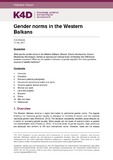Gender Norms in the Western Balkans
Abstract
The Western Balkans remains a region dominated by patriarchal gender norms. The biggest
challenge for improving gender equality is changing the mentality of women and men towards
traditional gender roles (Petričević, 2012). The literature consistently identifies social attitudes as
a barrier to increasing gender equality. Many people are not aware of women’s rights or gender
non-discrimination laws (Petričević, 2012). In several areas of gender equality, legal provisions
are adequate and conform to UN and international norms. However, these are not always
implemented or adhered to in practice, due to lack of capacity, knowledge, resources or social barriers.
Standard indicators of gender equality include: female/male school enrolment; literacy rate; unemployment; maternal mortality; life expectancy; adolescent fertility rate; proportion of women in parliament1. Others include violence against women and girls; gender equality policy and legislation. Much of the literature recognises the need to include men and raise men’s awareness about gender issues. Most of the literature on the Western Balkans looks at interpersonal and household gender norms, such as girls’ access to school, women’s work and household decision making. There is also a strong literature on women’s political participation and violence against women and girls.
This report provides a brief summary of the main gender issues in the region, as reported in the literature. It is not a comprehensive literature review, but a collection of resources which highlight the key points to consider on gender. Each country has a large selection of resources on its specific gendered issues, which can provide more detail. There is a companion piece to this report which focuses on the relationship between gender and conflict in the Western Balkans2. This report sketches the main parameters of gender in the region.
Citation
Browne, E. (2017). Gender in the Western Balkans. K4D Helpdesk Report. Brighton, UK: Institute of Development Studies.Is part of series
K4D Helpdesk Report;058Rights holder
DFIDCollections
- K4D [937]

